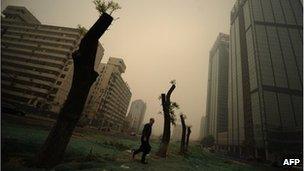Beijing in air pollution action
- Published

Many Beijingers feel the official data do not reflect reality
China will open up Beijing's pollution monitoring station to the public, state media says, as a web campaign for reform of the system gathers pace.
Environmental official Hua Lei said he hoped the move would "allay the public's fears".
Official statistics have often given much lower readings of air pollution than other data sources.
Last week property tycoon Pan Shiyi launched a web campaign appealing for tighter monitoring procedures.
Beijing residents have become increasingly concerned at the way the government measures air quality after the US embassy began publicising its own pollution readings.
At one point last week, the US embassy's data suggested "hazardous" levels of pollution, while Chinese data said air pollution was only minor.
Officials hit back at the embassy, accusing it of over-hyping the issue.
But days later Mr Hua, vice head of the municipal government's environmental protection monitoring centre, announced he would open the facility.
"With their rising quality of life, Beijing residents are increasingly concerned about the environment," he was quoted as saying by state news agency Xinhua, external.
"We hope the new move can allay the public's fears."
The discrepancy between the two sets of figures is because the US embassy measures particles under 2.5 micrometres, while the Beijing authorities monitor particles under 10 micrometres.
The smaller particles are most harmful to people's health, so the embassy's results are regarded by many as more significant.
Mr Pan launched a campaign on his weibo microblog urging the authorities to adopt the embassy's statistical methods.
The tycoon, who has more than seven million followers, posted a poll asking people to vote on whether they wanted the government to adopt the embassy's measuring technique.
As of Wednesday, some 37,700 had responded, with 98% backing his call.
- Published15 June 2011
- Published28 February 2011
- Published25 November 2010